|
|
|
Sort Order |
|
|
|
Items / Page
|
|
|
|
|
|
|
| Srl | Item |
| 1 |
ID:
157939
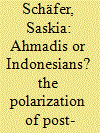

|
|
|
|
|
| Summary/Abstract |
Since the fall of Suharto in 1998, Indonesian public discourse about “mainstream” Muslim identity and practice has polarized sharply into various factions. This article offers a detailed analysis of a subset of this discourse that focuses on the Ahmadiyya in order to grasp how the new normative contours of Islam are being shaped in Indonesia. I make three arguments: First, the discourse is homogenizing what was once a wide spectrum of identitarian positions, and that consequently, Islamic diversity in Indonesia is shrinking. Second, the various internally homogenized sets of arguments for and against the Ahmadiyya mis-engage with each other in a way that produces social fragmentation and further polarization. Third, these arguments produce exclusionary mechanisms that reinforce each other. Both the opponents of the Ahmadiyya and their defenders exclude Ahmadis from conceptions of an Indonesian “majority.” This dynamic in Indonesian public discourse has resulted in the acceleration of the marginalization of the Ahmadiyya within an increasingly fragmented Indonesian society.
|
|
|
|
|
|
|
|
|
|
|
|
|
|
|
|
| 2 |
ID:
157941


|
|
|
|
|
| Summary/Abstract |
“At the mass grave, girl” said my key informant, when I asked her where she wanted to meet one Tuesday afternoon in Tacloban City, Philippines. She sounded blasé when she said this, as if she asked me to meet her in the market or the town plaza. Nothing in her tone indicated that it had been only two years since, on November 8, 2013, more than 6000 people perished from Typhoon Haiyan – one of the strongest storms to make landfall in recent history. Two thousand two hundred of these casualties are buried in the Holy Cross Memorial Park where she wanted to meet.
|
|
|
|
|
|
|
|
|
|
|
|
|
|
|
|
| 3 |
ID:
157944
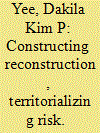

|
|
|
|
|
| Summary/Abstract |
Analysis of post-disaster reconstruction of urban areas has largely been understood as a function of technocratic and institutionalist paradigms, while critical perspectives have been largely influenced by the analysis of “disaster capitalism.” Common to these paradigms is little analysis of state attempts to deploy power over a population through controlling space in urban areas. This paper examines the strategies of internal territorialization undertaken by the Philippines state in post-Haiyan reconstruction polices. Drawing on data from Tacloban City, I show how bourgeois environmentalist and urban ecological security approaches exclude the urban poor from undertaking reconstruction in coastal communities. Discourses of cleanliness and securing the population of the city have accompanied material practices that enforce state territorialization in the city. These processes of state territorialization exclude those residing in risk prone zones from various forms of aid and relief. This paper concludes by highlighting processes of territorialization that have generated conflict in the city, as poor residents engage in forms of counter-territorialization to assert their space in the city.
|
|
|
|
|
|
|
|
|
|
|
|
|
|
|
|
| 4 |
ID:
157940
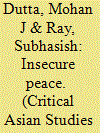

|
|
|
|
|
| Summary/Abstract |
This paper examines emerging citizen and local government relations in a village in the Junglemahal region of the state of West Bengal, once a major bastion of the Maoist insurgency in India. Since 2014, Junglemahal has not experienced a single Maoist-related incident. This has been widely attributed to the West Bengal government’s “model” handling of the insurgency, which rests on the rapid mobilization of public services through the non-elected arms of local governments, bypassing elected officials. How have Junglemahal’s residents experienced this particular form of post-conflict governance? Drawing on the culture-centered approach that ethnographically observes the processes of identifying development problems and developing community-grounded solutions to these problems, our findings indicate that the hyper-developmental state was paradoxically experienced by our respondents as a very distant entity. A recurrent theme in our interviews is the absence of a locally embedded party leadership that could be approached regarding issues of distributive justice. We argue that this desire for party mediation in public service delivery is an expression of a powerful social norm that has survived the conflict and ought to be integrated into post-conflict governance structures if the current peace is to endure.
|
|
|
|
|
|
|
|
|
|
|
|
|
|
|
|
| 5 |
ID:
157943
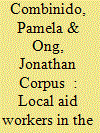

|
|
|
|
|
| Summary/Abstract |
This paper examines the experiences of Filipino workers recruited for technology and communications work by international aid agencies involved in the Typhoon Haiyan response. Filipino workers, many of whom were personally coping with the social and economic impact of this disaster, were hired on short-term contracts to test and implement various digital humanitarian innovations such as feedback and hazard mapping technological platforms. These workers were doubly marginalized: first, as tech workers whose work was viewed by aid officers on the ground as less substantial than that of food or shelter programs; and second, as local voices often drowned out by national and international colleagues. Moving beyond the usual figure of the cosmopolitan and adventure-seeking Western humanitarian acting on distant suffering, this paper draws attention to local aid workers’ aspirations for personal and professional mobility as they seize novel opportunities opened up by the digital humanitarian agenda. It outlines how the digital humanitarian project’s ambition to facilitate the inclusion of disaster-affected communities is fundamentally undermined by labor arrangements that doubly marginalize local aid workers.
|
|
|
|
|
|
|
|
|
|
|
|
|
|
|
|
| 6 |
ID:
157937


|
|
|
|
|
| Summary/Abstract |
This year marks the fiftieth anniversary of the founding of the Committee of Concerned Asian Scholars (CCAS). The CCAS was established in March 1968 when, during the annual meeting of the Association for Asian Studies (AAS) in Philadelphia, a group of graduate students and faculty walked out in protest over the AAS’s unwillingness to publicly question American policies in Asia. In May 1968, CCAS published the first issue of the CCAS Newsletter, designed to be a platform for scholars, students, and activists frustrated with the complacency of the scholars who dominated the field of Asian Studies at the time, particularly their unwillingness to critique the American War in Vietnam and their scholarship that rejected without deeply examining the premises underlying the formation of the People’s Republic of China (PRC). This first issue of what would soon be renamed the Bulletin of Concerned Asian Scholars and, in 1992, Critical Asian Studies, opened with “A Statement of Directions” written by Leigh Kagan, who, with Jon Livingston, served as the first editors.
|
|
|
|
|
|
|
|
|
|
|
|
|
|
|
|
| 7 |
ID:
157938


|
|
|
|
|
| Summary/Abstract |
We first came together in opposition to the brutal aggression of the United States in Vietnam and to the complicity or silence of our profession with regard to that policy. Those in the field of Asian Studies bear responsibility for the consequences of their research and the political posture of their profession. Committee of Concerned Asian Scholars (CCAS) Statement of Purpose, March 1969
|
|
|
|
|
|
|
|
|
|
|
|
|
|
|
|
| 8 |
ID:
157942


|
|
|
|
|
| Summary/Abstract |
For the last forty years, remittances have been a lifeline for some Filipinos in times of crisis as well as everyday life. So, it was no surprise when the media and nongovernmental organizations credited the Philippine diaspora with playing a significant role in post-disaster recovery after Typhoon Haiyan/Yolanda struck in 2013. While remittances poured in after this disaster, they were differently experienced, had different impacts, and led to uneven post-disaster outcomes. This article highlights the class-based inequalities that structure access to and mobilization of remittances after post-disaster recovery. We compare the experiences of middle- and lower-class households in three communities heavily affected by Haiyan in Tacloban City, Philippines, to investigate who benefitted and who was excluded from remittances in this post-disaster recovery. The findings of the case study shed light on wider issues of poverty, class, and vulnerability in the Philippines.
|
|
|
|
|
|
|
|
|
|
|
|
|
|
|
|
| 9 |
ID:
157945
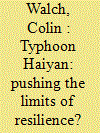

|
|
|
|
|
| Summary/Abstract |
Disaster risk reduction has been an important priority in the Philippines for the last twenty years. Yet Typhoon Haiyan still resulted in at least 6000 deaths and affected more than 14 million people. Why was this the case in a country supposedly well equipped to respond to natural disasters? While there are several explanations, including the sheer scale of this typhoon, corruption, and implementation challenges, this paper focuses on growing social and economic inequalities. This paper argues that the resilience discourse and framework at the national level do not translate into programs that help lift people out of poverty, particularly landless people. This is because state-led resilience policies focus on technical aspects of recovery rather than the root cause of vulnerabilities, explaining to some extent the high level of casualties in the wake of typhoon Haiyan. Evidence supporting this argument is drawn from more than forty interviews between 2013 and 2015 with disaster victims and professionals involved in resilience building.
|
|
|
|
|
|
|
|
|
|
|
|
|
|
|
|
| 10 |
ID:
157946
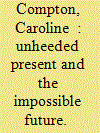

|
|
|
|
|
| Summary/Abstract |
Recovery plans were developed for both the Philippines and Tacloban City in particular. They framed Haiyan as a climate change emergency, and sought to respond to future risks to the city and country. This focus on future recovery came at the expense of attention to the transitional needs of those worst affected by the Typhoon. International humanitarian organizations were co-opted into the government’s refusal of transitional assistance to Tacloban City shoreline residents. This was because they construed their mandate of apolitical assistance in a particular way. An alternative framing of emergency deployed by a local organization produced a very different result. In order to respond to the range of temporal needs in post-disaster situations, humanitarian actors need to be cognizant of the range of epistemic frameworks available to them.
|
|
|
|
|
|
|
|
|
|
|
|
|
|
|
|
|
|
|
|
|